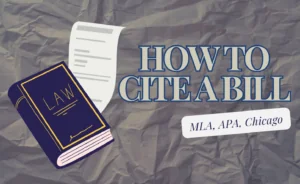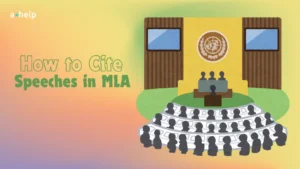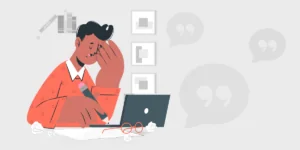In creative and academic fields, where respect for others’ work is monumental, it’s absolutely necessary to understand and differentiate between two types of violations: plagiarism and copyright infringement.

✅ AI Essay Writer ✅ AI Detector ✅ Plagchecker ✅ Paraphraser
✅ Summarizer ✅ Citation Generator
Plagiarism involves taking someone else’s work or ideas and passing them off as your own, which breaches ethical standards. Copyright infringement, a step further, violates legal boundaries by using someone’s protected work without permission. Let’s find out everything about their nuances, impacts, and how to avoid both.
What is Plagiarism?
Plagiarism is the practice of taking someone else’s work or ideas without giving them proper credit and making it appear as if they were your own. This issue is not limited to academic papers or school assignments. It affects many professional disciplines, including journalism, literature, music, and even the technology business. Plagiarism is an unethical activity since it undermines honesty and integrity. Getting found plagiarizing can have significant implications, including poor marks in school, tarnished reputations, and even legal action in the job. It’s all about acknowledging the original artists’ efforts.
In education, common types of plagiarism include:
- Direct Plagiarism: Copy-pasting someone’s work without quotation marks or citation.
- Self-Plagiarism: Submitting your own previously submitted work as new.
- Mosaic Plagiarism: Piecing together bits of different sources without proper attribution.
- Accidental Plagiarism: Unintentionally failing to cite sources or misquoting them.
- Paraphrasing Plagiarism: Rewriting someone’s ideas in your own words without giving them credit.
What is Copyright Infringement?
Copyright infringement is defined as the unauthorized use of copyrighted material, which includes distribution, public performance, and the creation of derivative works. It reduces the copyright holder’s ability to profit from their creations as products of intellectual property. Legal measures may include stop and desist orders, monetary damages, and, in severe circumstances, criminal accusations. Common occurrences that result in allegations include utilizing copyrighted photos in blogs without authorization, copying articles on websites, and covering music without a legal license.
Copyright infringement can exist in various forms, such as:
- Direct Infringement: Using the entirety or a substantial part of copyrighted work without permission.
- Secondary Infringement: Facilitating or contributing to copyright violations, like hosting illegal downloads.
- Public Performance: Playing copyrighted music or showing movies publicly without a license.
- Derivative Works: Creating new works based on the original copyrighted material without consent.
Some notable copyright infringement cases in music and pop culture include:
Led Zeppelin vs. Spirit: Allegations that Led Zeppelin’s “Stairway to Heaven” borrowed from Spirit’s “Taurus.” The case was complex, with Led Zeppelin ultimately prevailing.
Vanilla Ice vs. Queen and David Bowie: Vanilla Ice’s “Ice Ice Baby” used the bassline from Queen and Bowie’s “Under Pressure” without initial credit or permission, resulting in a financial settlement.
Comparative Analysis
Understanding the difference between plagiarism and copyright infringement can be tricky since both deal with using someone else’s work without permission. However, plagiarism is mainly an ethical issue, focusing on the lack of attribution to the original creator, seen often in academic and professional contexts.
| Copying text from a research article without citing the source is plagiarism. |
Copyright infringement, on the other hand, is a legal issue, where the unauthorized use of copyrighted material can lead to lawsuits. Using a copyrighted song in a commercial video without obtaining rights is copyright infringement.
There are cases where actions might overlap. For instance, publishing a plagiarized article can also be copyright infringement if the plagiarized content is copyrighted. This distinction is vital for respecting moral and legal boundaries in creative and scholarly work.
| Aspect | Plagiarism | Copyright Infringement |
|---|---|---|
| Nature | Ethical/academic issue | Legal issue |
| Definition | Using someone’s ideas or work without proper attribution | Unauthorized use of copyrighted material |
| Consequences | Academic penalties, loss of reputation | Legal action, fines, or damages |
| Examples | Copying text for a paper without citing the source | Using a copyrighted song in a video without permission |
Conclusion
It’s important to know the difference between taking someone’s ideas without saying where they came from, which is more about being fair and honest, and using someone’s creative work without permission, which can get you into legal trouble. Both actions disrespect the original creators, but one can lead to bad grades or a loss of trust, while the other could mean facing a lawsuit or paying fines. So, it’s crucial to always give credit and get permission when needed to avoid these issues.
Never forget about the importance of submitting only original content. We recommend using our Plagiarism Checker to review your paper just in case and avoid any plagiarism accusations.
FAQ
Follow us on Reddit for more insights and updates.





Comments (0)
Welcome to A*Help comments!
We’re all about debate and discussion at A*Help.
We value the diverse opinions of users, so you may find points of view that you don’t agree with. And that’s cool. However, there are certain things we’re not OK with: attempts to manipulate our data in any way, for example, or the posting of discriminative, offensive, hateful, or disparaging material.